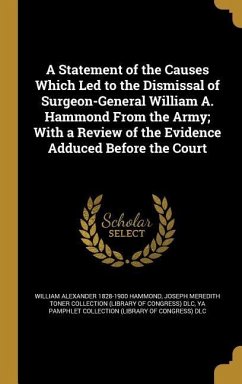Please note that the content of this book primarily consists of articles available from Wikipedia or other free sources online. William Alexander Hammond, M.D. (August 28, 1828 January 5, 1900) was an American neurologist and the 11th Surgeon General of the U.S. Army (1862 1864). In addition to his pioneering work in neurology and his military service, especially during the Civil War, he founded the Army Medical Museum (now called the National Museum of Health and Medicine), co-founded the American Neurological Association, and gave his name to Hammond''s disease, a type of athetosis which he was the first to describe in 1871. William Hammond was born in Annapolis, Maryland, but moved to Harrisburg, Pennsylvania at the age of five and spent the remainder of his childhood there. He received an M.D. from the University of the City of New York at the age of twenty, and after an internship and a few months in a private practice, he became an Assistant Surgeon in the U.S. Army in July1849.








